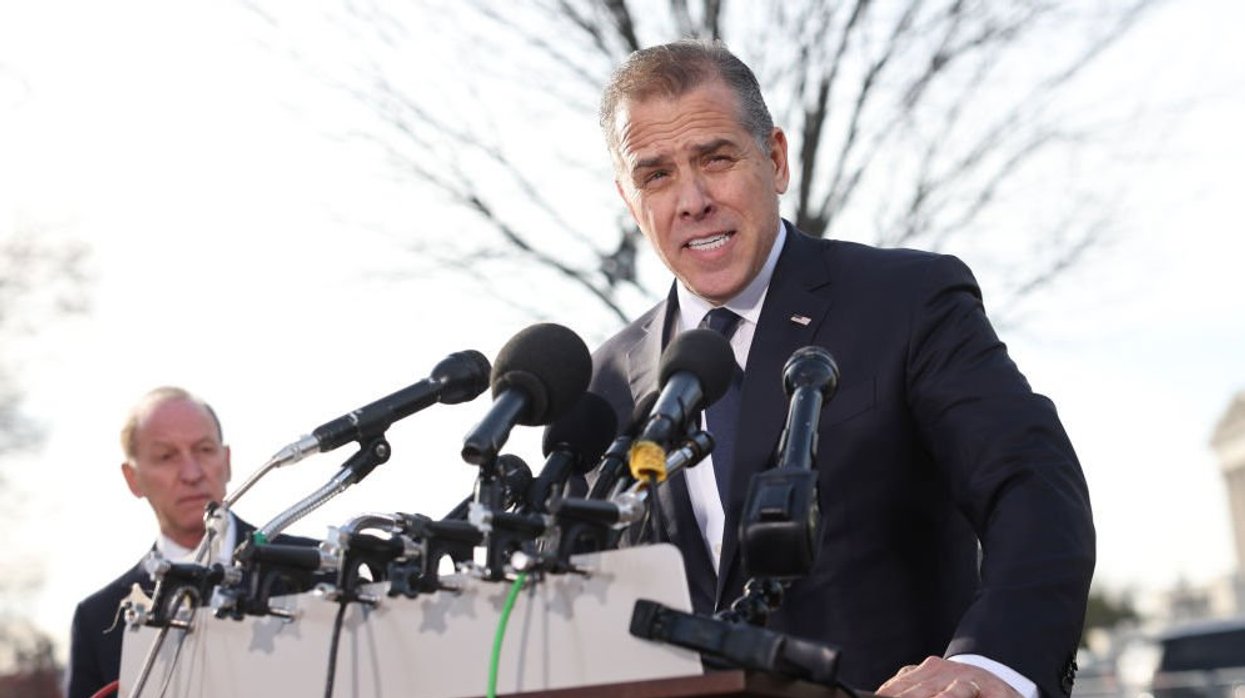
Kevin Dietsch/Getty Images

A federal judge issued Hunter Biden a decisive legal defeat on Monday.
Earlier this year, Hunter's attorneys filed eight motions to dismiss criminal tax charges against him. Among other reasons, they argued the nine-count indictment should be tossed because:
But United States District Judge Mark Scarsi bought none of Hunter's arguments.
In an extensive 82-page ruling that was handed down weeks before his self-imposed deadline of April 17, Judge Scarsi decimated each argument that Hunter's attorneys made in their motions to dismiss.
Leaning on standard interpretive rules for contracts, Scarsi determined that Biden's pretrial diversion agreement is not in effect, and thus Hunter does not have immunity.
"Having found that the Diversion Agreement is a contract that binds the parties but that the parties made the Probation Officer’s signature a condition precedent to its performance, the Court turns to Defendant’s theory of immunity: that the United States’ obligation to refrain from prosecuting Defendant ... is currently in force. It is not," Scarsi ruled.
Scarsi found that Hunter's argument regarding Weiss' appointment — and specifically his appointment as a special counsel — "clearly places form over substance."
That's because Hunter's attorneys conceded multiple times in their filings that Attorney General Merrick Garland has the statutory authority "to appoint a prosecutor."
"Following Defendant’s logic, the Attorney General could have appointed Mr. Weiss 'Designated Counsel' pursuant to the Attorney General’s statutory authority and the issue Defendant complains of would disappear. That the Attorney General used the term 'Special Counsel' instead of some other term similarly indicative of an independent counsel is a distinction without a difference," Scarsi explained.
Moreover, Scarsi determined that "Weiss is lawfully funded through the indefinite appropriation, and the Appropriations Clause has not been violated."
Scarsi not only ruled against Hunter, but the judge scolded Hunter's argument and evidence — or lack thereof.
"As the Court stated at the hearing, Defendant filed his motion without any evidence," Scarsi wrote.
"The motion is remarkable in that it fails to include a single declaration, exhibit, or request for judicial notice. Instead, Defendant cites portions of various Internet news sources, social media posts, and legal blogs. These citations, however, are not evidence," he continued. "To that end, the Court may deny the motion without further discussion."
Still, Scarsi gave Hunter's argument some discussion.
The evidence Hunter's attorneys provided to support their allegations are "only conjecture," Scarsi said. And even then, the judge found those circumstantial allegations to be "thin" — at best.
Hunter's attorneys argued that Hunter's due process rights were violated by the actions of the two IRS whistleblowers, claiming they leaked confidential information about Hunter's taxes.
Not only did Scarsi disagree, but he explained that it would not be appropriate for the court to exercise its "supervisory powers" on the motion.
"Aside from failing to substantiate his allegations that the agents influenced the prosecutorial decision with anything but speculation, Defendant offers no case in which a court exercised supervisory powers to dismiss an indictment due to conduct that impacts the fundamental decision to prosecute," Scarsi wrote.
"Defendant offers no facts to suggest that the information Shapley and Ziegler shared publicly had any prejudicial effect on the grand jury’s decision to return an indictment," he explained. "That Shapley and Ziegler’s public statements brought notoriety to Defendant’s case is not enough to show prejudice."
Abbe Lowell, Hunter's lead attorney, suggested in a statement on Monday that Hunter may appeal Scarsi's ruling.
"We strongly disagree with the Court’s decision and will continue to vigorously pursue Mr. Biden’s challenges to the abnormal way the Special Counsel handled this investigation and charged this case," Lowell said.
Unless Scarsi's ruling is overturned, Monday's decision means the first son is headed to trial, which is scheduled to begin on June 20.
Meanwhile, U.S. District Judge Maryellen Noreika has not yet ruled on Hunter's motions to dismiss his federal gun crimes. Many of his arguments in that case mirror those that Scarsi rejected.
If Noreika takes the same views as Scarsi, Hunter will begin trial for that case on June 3.
Like Blaze News? Bypass the censors, sign up for our newsletters, and get stories like this direct to your inbox. Sign up here!